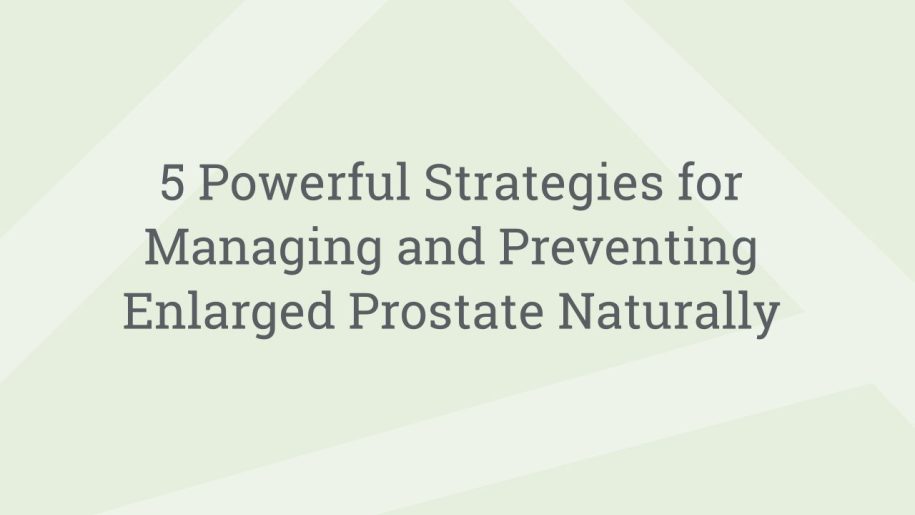5 Powerful Strategies for Managing and Preventing Enlarged Prostate Naturally
Table of Contents
The Benefits of Regular Exercise
Regular exercise not only contributes to overall physical health, but it can also help to prevent an enlarged prostate. Exercise can help with maintaining a healthy weight, reducing inflammation, and decreasing stress – all of which are factors that play a role in prostate health. Consider incorporating aerobic exercises such as jogging or cycling, strength training using weights or resistance bands, and stretching into your routine. Aim for 30 minutes of exercise, at least five times a week.
The Importance of a Balanced Diet
A healthy and balanced diet can play a significant role in managing and preventing an enlarged prostate. Focus on consuming whole foods such as fruits and vegetables, lean protein sources, and healthy fats. Foods high in zinc, such as pumpkin seeds and spinach, and those with anti-inflammatory properties, such as tomatoes and berries, can also be beneficial. Avoid processed and high-fat foods, as well as excessive caffeine and alcohol consumption.
Understanding and Managing Stress
Stress can not only affect mental health but physical health as well, leading to inflammation and issues with prostate health. Take time for yourself each day to relax and engage in stress-reducing activities such as meditation, yoga, or deep breathing exercises. Consider limiting exposure to stressful situations and managing your time effectively to reduce stress.
The Power of Positive Thinking
Believe it or not, your attitude can affect your prostate health. Positive thinking may help to reduce stress and inflammation, leading to a healthier prostate. Focus on positive self-talk and surrounding yourself with positive influences. Consider journaling or practicing daily affirmations to help promote positivity.
The Role of Sleep in a Healthy Lifestyle
Getting enough quality sleep is essential for overall health, including prostate health. Aim to get at least 7-8 hours of sleep each night and establish a sleep routine that works for you. Consider avoiding caffeine and electronics before bedtime and creating a comfortable sleep environment.
Overcoming Obstacles to Fitness
It’s normal to encounter obstacles or setbacks on the path to fitness, but don’t let them derail your progress. Adjust your routine and expectations as needed and consider seeking guidance from a healthcare professional or personal trainer. Remember to listen to your body and push yourself within your means.
The Importance of Setting Realistic Goals
Setting realistic and specific fitness goals can help sustain motivation and measure progress. Consider setting achievable goals such as increasing exercise time by 10 minutes each week or losing 1-2 pounds per month. Celebrate reaching these goals and adjust as needed.
Creating a Support System
Having a support system can make all the difference in maintaining a healthy lifestyle. Consider joining a fitness class, workout group, or online community for support and motivation. Don’t be afraid to ask friends or family to join you on your fitness journey.
Tips for Staying Motivated
Staying motivated can be a challenge, but there are ways to stay on track. Consider tracking progress and celebrating milestones, finding a workout buddy, or rewarding yourself for reaching fitness goals. Also, remember to focus on the positive benefits of exercise, rather than just the physical results.
Celebrating Small Victories
It’s important to recognize and celebrate small achievements along the way to your overall fitness goals. Progress should be measured beyond the physical changes – focus on how exercise is improving your overall quality of life, including your prostate health.
Embracing a Healthy Lifestyle as a Journey
Remember, living a healthy lifestyle is a journey, not a destination. Embrace the process, set achievable goals, and focus on making lasting changes. Don’t be discouraged by setbacks and remember to listen to your body and make adjustments as needed.
Conclusion
Incorporating these strategies, regular exercise, a well-balanced diet, stress management techniques, positivity, adequate sleep, and support, can play a significant role in managing and preventing an enlarged prostate, while promoting overall health and wellness. Consult with a healthcare provider for individualized recommendations and analysis of potential risk factors.
